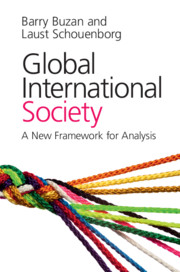Crossref Citations
This Book has been
cited by the following publications. This list is generated based on data provided by Crossref.
Buzan, Barry
2018.
China’s rise in English school perspective.
International Relations of the Asia-Pacific,
Wilson, Peter
and
Oliver, Tim
2019.
The international consequences of Brexit: an English School analysis.
Journal of European Integration,
Vol. 41,
Issue. 8,
p.
1009.
Falkner, Robert
and
Buzan, Barry
2019.
The emergence of environmental stewardship as a primary institution of global international society.
European Journal of International Relations,
Vol. 25,
Issue. 1,
p.
131.
Acharya, Amitav
and
Buzan, Barry
2019.
The Making of Global International Relations.
Zala, Benjamin
2020.
Interpreting great power rights in international society: Debating China’s right to a sphere of influence.
Journal of International Political Theory,
Vol. 16,
Issue. 2,
p.
210.
Buzan, Barry
2020.
The transformation of global international society and the security agenda. Interview with Professor Barry Buzan.
Security and Defence Quarterly,
Vol. 30,
Issue. 3,
p.
7.
Buzan, Barry
2020.
Afterword to: ‘Networking hegemony—alliance dynamics in East Asia’.
International Politics,
Vol. 57,
Issue. 2,
p.
285.
Dian, Matteo
and
Meijer, Hugo
2020.
Networking hegemony: alliance dynamics in East Asia.
International Politics,
Vol. 57,
Issue. 2,
p.
131.
Stroikos, Dimitrios
2020.
China, India, and the social construction of technology in international society: The English School meets Science and Technology Studies.
Review of International Studies,
Vol. 46,
Issue. 5,
p.
713.
Bevir, Mark
and
Hall, Ian
2020.
Interpreting the English school: History, science and philosophy.
Journal of International Political Theory,
Vol. 16,
Issue. 2,
p.
120.
Dias, Alexandra M.
2020.
Visions of African Unity.
p.
183.
COSTA BURANELLİ, Filippo
and
TAEUBER, Simon F.
2021.
The English School and Global IR – A Research Agenda.
All Azimuth: A Journal of Foreign Policy and Peace,
Hurrell, Andrew
2021.
International Society.
p.
31.
Aslaksen, Erik W.
2021.
Measures of Social Evolution.
p.
53.
Schouenborg, Laust
2021.
International Society.
p.
79.
Uesugi, Yuji
and
Richmond, Oliver P.
2021.
The Western International Peace Architecture and the Emergence of the Eastphalian Peace.
Global Society,
Vol. 35,
Issue. 4,
p.
435.
Korosteleva, Elena
and
Paikin, Zachary
2021.
Russia between east and west, and the future of Eurasian order.
International Politics,
Vol. 58,
Issue. 3,
p.
321.
Parrat, Charlotta Friedner
and
Spandler, Kilian
2021.
International Society.
p.
145.
Schouenborg, Laust
and
Taeuber, Simon F
2021.
A quantitative approach to studying hierarchies of primary institutions in international society: The case of United Nations General Assembly disarmament resolutions, 1989–1998.
Cooperation and Conflict,
Vol. 56,
Issue. 2,
p.
224.
Fehl, Caroline
and
Freistein, Katja
2021.
(Un)making global inequalities: International institutions in a stratified international society.
Journal of International Relations and Development,
Vol. 24,
Issue. 2,
p.
251.



